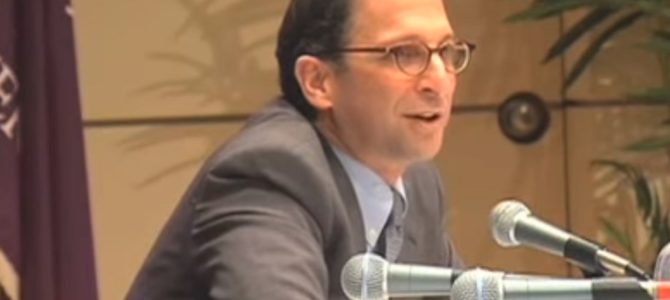
Nearly four months ago, Houston-based attorney Kevin Fulton filed, on my behalf, a motion to unseal records in a case headed by Andrew Weissmann, who is now a member of Special Counsel Robert Mueller’s team. Late Thursday, a federal district court judge in Texas granted (with one exception), the motion to unseal, making some of those documents publicly available for the first time.
The sealed records involved the Enron case Weissmann oversaw prior to his abrupt departure from the Enron Task Force in the middle of jury deliberations. Given Weissmann’s current role as Mueller’s “pit bull,” revisiting the allegations of misconduct leveled against the prosecutor—with the benefit of the entire unsealed record—promotes transparency and the public’s interest in trusting the integrity of the special counsel’s team.
The now unsealed records expose efforts by Weissmann, and the Enron Task Force he led, to intimidate witnesses and to interfere in the attorney-client relationship of a cooperating witness. Several affidavits unsealed last week catalogued veiled threats made to witnesses the Enron defendants sought to interview. However, because many of the attorneys would speak only off the record to Enron’s attorneys, the courts refused to consider the affidavits sufficient to prove prosecutorial misconduct.
Two attorneys, however, were willing to testify. In a just-unsealed affidavit, one lawyer stated that an FBI agent working for the Enron Task Force overseen by Weissmann warned his client against talking to the Enron defense team because “those are bad guys.” The second attorney stated that an FBI agent had made veiled threats against his client in a separate Enron trial.

Still more troubling, though, was an email Weissmann sent to William Dolan, one of the two attorneys representing a cooperating witness, Ken Rice, concerning Rice’s second attorney, Dan Cogdell. Weissmann’s email accused Cogdell of having a conflict of interest because Cogdell was seen talking with another defense lawyer. In the email, Weissmann suggested Cogdell’s supposed conflict left Rice two options: “instructs his lawyers who they can speak to and who they cannot;” [or] determine[] that his attorney has not acted in Rice’s best interests and gets rid of him.”

The Enron defendants believed Weissmann’s email sought to silence Rice, but because Rice’s attorney testified that the email did not “affect Rice’s decision on whether to cooperate with the defense,” the court refused to find “the email was an improper threat.” Nonetheless, a federal appellate court noted that “Weissmann would have done well to have brought the issue to the court’s attention instead of emailing Rice’s lawyer.”
While the Enron defendants believed Weissmann’s email sought to silence Rice, Rice’s attorney, Cogdell, saw Weissmann as instead attempting to force him off the case. In a three-page letter Cogdell sent in response to Weissmann’s email—the entirety of which is worth a read, both for the sake of clarity and amusement—Cogdell wrote: “You conclude, with absolutely no basis whatsoever, that I have ‘violated client confidences of Rice.’ Nothing could be further from the truth and any suggestion is not only without merit it is nothing more than a transparent attempt on your part to ‘disqualify’ a lawyer whom you dislike because of the result your task force suffered in the Barge case. I will state what you lack the candor to put in writing—you do not like me. Rest easy, the feeling is mutual.”
(The “Barge case” referred to the first criminal trial brought by the Enron Task Force—and one that ended in an embarrassing defeat for the government when a jury acquitted Cogdell’s client.)
In addition to Weissmann’s inappropriate attempt to push Cogdell off the case, a 17-page report unsealed on Thursday by expert witness Michael Tigar detailed many more vagrancies. Especially troubling to Tigar was the Enron Task Force’s use of “multiple grand juries working over several years” not to “return fresh indictments or start new cases, but to make the threat of indictment real and tangible” to the nearly 90 unindicted co-conspirators.

In its reply to my motion to unseal the documents, the Department of Justice downplays these facts, by stressing that the Fifth Circuit held that the Enron Task Force’s conduct did not violate the defendants’ constitutional rights. In fact, the DOJ spent nearly one-third of the approximate 30-page brief defending Weissmann’s conduct even though that discussion was entirely irrelevant to the question of whether the documents should be unsealed—something the DOJ agreed was appropriate.
In any event, although it is true that Weissmann’s conduct in the Enron case did not reach the level of a constitutional violation, that doesn’t mean it was appropriate. Nor was Weissmann’s disconcerting behavior isolated: Weissmann has demonstrated a “reckless win-until-reverse modus operandi that has destroyed countless lives. Weissmann’s tactics sent four Merrill Lynch executives to prison, until a federal appellate court overturned their convictions and freed the men—but not before upending their lives.”
Weissmann also destroyed the former accounting giant Arthur Andersen by pushing a phony criminal case. The Supreme Court eventually overturned it unanimously, but only years later, after the damage had been done.
Given Weissmann’s past, as demonstrated by the recently unsealed court documents, and the politically charged nature of the special counsel’s investigation, Mueller would have been wise to have selected individuals beyond reproach for his team. And that is clearly not Weissmann.









